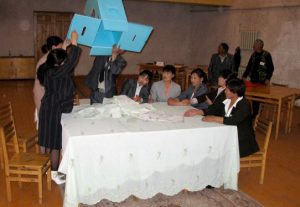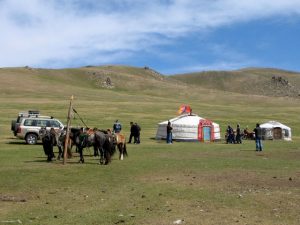Memo #161
By Julian Dierkes (julian.dierkes [at] ubc.ca) and Mendee Jargalsaikhan (mendee [at] interchange.ubc.ca)
Elections are milestones in democratic development. With the closing of nominations on June 6, 2012, the campaign for the Mongolian parliamentary election officially opens. Observers seem pessimistic about Asia’s only post-socialist democracy. But the upcoming election promises to be more carefully organized and transparent, and public discussions of corruption will strengthen democracy.
Most Mongolians suspect political leaders of corruption. This perception has cast a dark cloud over Mongolia’s potential for economic and political development. Yet, corruption has not been a central topic of election campaigns or public discussions in the past.
The recent arrest of N Enkhbayar, a former prime minister, chairman of the Ikh Khural and president, and several provincial governors hints at the manipulation of political and judicial processes by all actors involved. The veracity of allegations will be determined by courts. In the meantime, the General Election Commission has rejected Enkhbayar’s nomination as a candidate. But the mere fact of public attention to corruption increases the potential for more transparent governance and provides a deterrent.
Under the authority of the General Election Commission, Canadian company Dominion Voting Systems is providing electronic voting machines. 1,839,984 eligible voters will receive biometric identification cards.
The two large, two smaller, and several minor political parties contesting in the election have been required to submit their platforms and to nominate candidates for new proportional representation party lists and majoritarian electoral ridings. Candidates submit stricter conflict of interest declarations that include information on family members’ business interests. The separation between elected officials and public servants has been enforced on the basis of recent legislative changes.
Domestic civil society is invited to monitor the election, partly to stave off political violence which occurred after the 2008 parliamentary election.
The road to a further institutionalization of democracy and thus a stable political context for economic development is a bumpy one. With limited policy making capacity, the Mongolian government has to address numerous challenges. But democratic legitimacy is the firmest ground for that road to be built on and the preparations for the upcoming election are pointing in the right direction.
About the Author:
Julian Dierkes – Keidanren Chair in Japanese Research, Institute of Asian Research, The University of British Columbia.
Mendee Jargalsaikhan – graduate of Master of Arts – Asia Pacific Policy Studies (MAAPPS), The University of British Columbia.
Links:
- Miners’ motherlode Mongolia faces instability ahead of June elections, Vancouver Sun, April 2012.
- Mongolia: democracy in the steppes, East Asia Forum, June 2012.
- Law on Election and Procedure for Observation, Mongolia General Election Commission.
- Mongolia: Transmogrification of a Communist Party, Pacific Affairs, Summer 2009.
Related Memos:
- Our other Memos on Mongolia.

